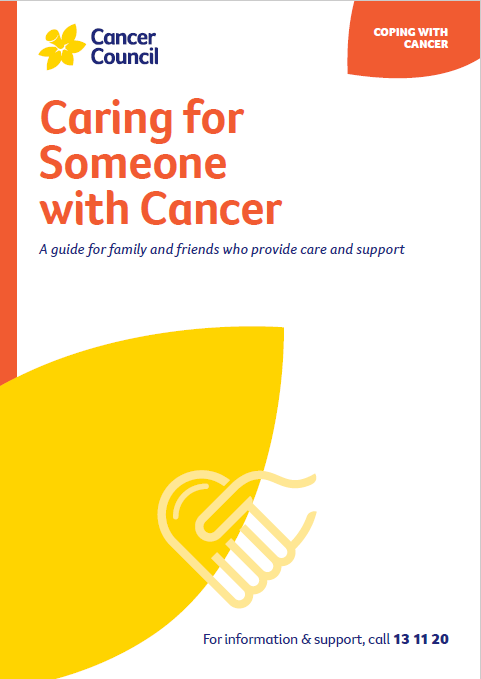- Home
- Cancer Information
- Advanced cancer
- Living with advanced cancer
- Information for carers
Information for carers
Caring for a person with advanced cancer can feel overwhelming at first. The future may be uncertain and you may feel that everything is out of control. You may both be trying to come to terms with the diagnosis and experiencing a range of strong emotions, such as fear, anger, sadness and grief.
Some people live with advanced cancer for years, and their needs will change as the disease progresses. The demands on you as a carer might increase, and will include physical, emotional and financial changes. You may have many questions and concerns – for example, will they be in pain, will they become depressed, or will they die.
As well as having to manage your emotions, you may also have to tell other family and friends. This can be time-consuming and difficult. If you need advice or support, contact your GP, hospital social worker, a palliative care service, a support group, hospital nurses, your oncologist or Cancer Council 13 11 20.
For more on this, call Cancer Council 13 11 20, see Carers, or listen to our podcast on Cancer Affects the Carer Too.
At first, I didn’t ask for help, because I didn’t want to bother anyone. I see caring as my duty; I have to do it. I now realise people genuinely want to help. They need my help to show them how.
Judy
→ READ MORE: Stories about people with advanced cancer
Video: Support for families and friends of people with advanced cancer
More resources
Dr Lucy Gately, Medical Oncologist, Alfred Health and Walter and Eliza Institute for Medical Research, VIC; Dr Katherine Allsopp, Supportive and Palliative Care Specialist, Westmead Hospital, NSW; A/Prof Megan Best, The University of Notre Dame Australia and The University of Sydney, NSW; Dr Keiron Bradley, Palliative Care Consultant, Medical Director Palliative Care Program, Bethesda Health Care, WA; Craig Brewer, Consumer; Emeritus Professor Phyllis Butow, Psychologist, The University of Sydney and Chris O’Brien Lifehouse, NSW; Louise Durham, Palliative Care Nurse Practitioner Outpatients, Princess Alexandra Hospital, Metro South Palliative Care, QLD; Dr Roya Merie, Radiation Oncologist, ICON Cancer Centre, Concord, NSW; Penny Neller, Project Coordinator, National Palliative Care Projects, Australian Centre for Health Law Research, Queensland University of Technology, QLD; Caitriona Nienaber, 13 11 20 Consultant, Cancer Council WA; Xanthe Sansome, Program Director, Advance Care Planning Australia, VIC; Sparke Helmore Lawyers; Peter Spolc, Consumer.
View the Cancer Council NSW editorial policy.
View all publications or call 13 11 20 for free printed copies.
Need to talk?
Support services
Coping with cancer?
Speak to a health professional or to someone who has been there, or find a support group or forum
Need legal and financial assistance?
Pro bono services, financial and legal assistance, and no interest loans
Cancer information
What is cancer?
How cancer starts and spreads
Dealing with the diagnosis
Common reactions to a cancer diagnosis and how to find hope

